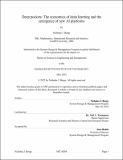Deep pockets: The economics of deep learning and the emergence of new AI platforms
Author(s)
Borge, Nicholas J.
DownloadThesis PDF (2.363Mb)
Advisor
Thompson, Neil C.
Terms of use
Metadata
Show full item recordAbstract
Organizations are increasingly faced with decisions about whether, and at what level, to invest in artificial intelligence (AI) in the development of new products and services. Invariably the business case is based on the performance and costs observed from an initial pilot or proof-of-concept, but these projects can be expensive and time consuming. This is particularly true for deep learning, which is the most important machine learning technique of the past decade. Also, the benefits and costs of deep learning systems scale differently with performance and deployment size, which leads to different organizations implementing systems of differing levels of capability.
This thesis addresses two questions. First, we show how the net benefit of implementing deep learning can be calculated a priori, based on prior research on scaling laws for performance. To help motivate and illustrate the analysis, we present a case study of a real deep learning application. Second, we explore the implications of the economics of individual investment decisions for the broader market dynamics.
We show that there are cutoffs whereby higher performance requires larger deployment sizes to be economically viable, that there is an optimal performance level that maximizes economic benefit given a fixed deployment size, and that these dynamics lead to concentration of market demand and the emergence of new platforms.
Date issued
2022-05Department
System Design and Management Program.Publisher
Massachusetts Institute of Technology